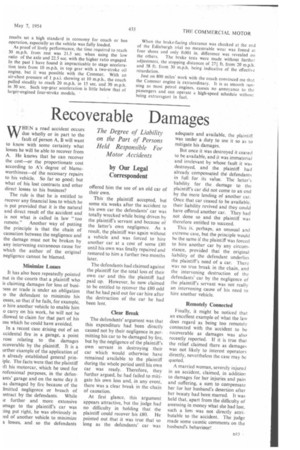Recoverable Damages
Page 59

If you've noticed an error in this article please click here to report it so we can fix it.
The Degree of Liability on the Part of Persons Held Responsible For Motor Accidents by Our Legal Correspondent
WHEN a road accident occurs due wholly or in part to the . fault of person A, B will want to know with some certainty what losses he will be able to recover from A. He knows that he can recover the cost—or the proportionate cost according to A's degree of blameworthiness—of the necessary repairs to his vehicle. So far so good; but what of his lost contracts and other direct losses to his business?
The rule is that he is entitled to recover any financial loss to which he is put provided that it is the natural and direct result of the accident and is not what is called in law "too remote." Another way of putting the principle is that the chain of causation between the negligence and the damage must not be broken by any intervening extraneous cause for which the author of the original negligence cannot be blamed.
Minimize Losses
It has also been repeatedly pointed out in the courts that a plaintiff who is claiming damages for loss of busiless or trade is under an obligation :o the defendant to minimize his osses, so that if he fails, for example, o hire another vehicle to enable him o carry on his work, he will not be Mowed to claim for that part of his oss which he could have avoided.
In a recent case arising out of an ccidental fire in a garage, a point rose relating to the damages ecoverable by the plaintiff. It is a Luther example of the application of n already established general priniple. The facts were that the plaintiff :ft his motorcar, Which he used for rofessional purposes, in the defenants' garage and on the same day it as damaged by fire because of the imitted negligence or breach of mtract by the defendants. While e further and more extensive image to the plaintiff's car was :ing put right, he was obviously in :ed of another vehicle to minimize s losses, and. so the defendants
offered him the use of an old car of their own.
This the plaintiff accepted, but some six weeks after the accident to his own car the defendants' car was totally wrecked while being driven by the plaintiff's servant and because of the latter's own negligence. As a result, the plaintiff was again without a vehicle and was forced to hire another car at a cost of son-le £80 until his own was finally repaired and restored to him a further two months later.
The defendants had claimed against the plaintiff for the total loss of their own car and this the plaintiff had paid up. However, he now claimed to be entitled to recover the £80 odd that he had paid out for car hire after the destruction of the car he had been lent.
Clear Break The defendants' argument was that this expenditure had been directly caused not by their negligence in permitting his car to he damaged by fire, but by the negligence of the plaintiff's own servant in destroying their car which would otherwise have remained available to the plaintiff during the whole period until his own car was ready. Therefore, they further argued, he had failed to mitigate his own loss and, in any event, there was a clear break in the chain of causation.
At first glance, this argument appears attractive, hut the judge had no difficulty in holding that the plaintiff could recover his £80. He pointed out that it was true that so long as the defendants' car was adequate and available, the plaintiff was under a duty to use it so as to mitigate his damages.
But once it was destroyed it ceased to be available, and it was immaterial and irrelevant by whose fault it was destroyed, and the plaintiff had already compensated the defendants in full for its value. The latter's liability for the . damage to the plaintiff's car did not come to an end by the mere lending of another car. Once that car ceased to be available. their liability revived and they could have offered another car. They had not done so and the plaintiff was therefore entitled to succeed.
This is, perhaps, an unusual and extreme case, but the principle would be the same if the plaintiff was forced to hire another car by any circumstance, provided that the original liability of the defendant underlies the plaintiff's need of a car. There was no true break in the chain, and the intervening destruction of the defendants' car by the negligence of the plaintiff's servant was not really an intervening cause of his need to hire another vehicle.
Remotely Connected
Finally, it might be noticed that an excellent example of what the law does regard as being too remotely connected with the accident to be recoverable as damages was also recently reported. If it is true that the relief claimed there as damages was not likely to interest operators directly, nevertheless the case may be quoted.
A married woman, severely injured in an accident, claimed, in addition to damages for her injuries and pain and suffering, a sum to compensate her for her husband's desertion after her beauty had been marred. It was held that, apart from the difficulty of assessing in money what she had lost, such a loss was not directly attributable to the accident. The judge made some caustic comments on the husband's behaviour!








































































































